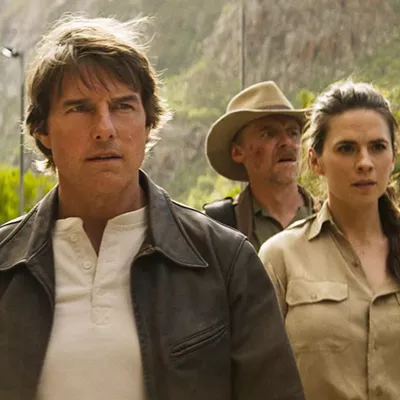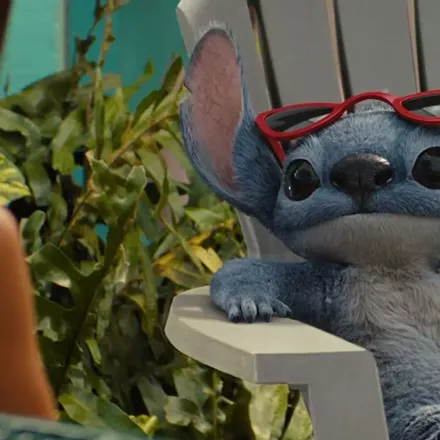A battle between pirate ships at sea: peg legs and eye patches, cutlasses drawn, cannon fire. A skiff hoves alongside a man o'war, point-blank broadsides are exchanged -- except that suddenly the stars are out, the ships have rocket thrusters, we're in outer space. Buccaneers reach warp speed; Star Trek sails the Seven Seas.
Treasure Planet, Disney's animated update of Robert Louis Stevenson's Treasure Island (written in 1881-83 but set in the 1740s), uses anachronism in the best sense: It mixes the customs and artifacts of one era with those of another, all in service of a larger goal. We're accustomed to thinking that that Bluebeard (the pirate) and Bluetooth (the wireless communications protocol) are worlds apart. Yet the Disney animators transform privateers into astronauts and back again, affording us a sudden recognition of ourselves, mirrored in the inhabitants of other worlds.
While the opening sequence blends chronology in a useful way, the next one uses imagination in the best sense. We see a boy, alone at night, huddled under the covers with flashlight and book, mentally conjuring faraway places and adventures. The flying space pirates were entirely in his mind -- yet his imagination conjures them into seeming real. Maybe they actually are out there. Maybe reading the classics isn't such a dry experience.
The little boy, of course, grows into the hero of our story, Jim Hawkins (voiced by Joseph Gordon-Levitt of TV's 3rd Rock from the Sun). Even though he's killer on his rocket-powered skateboard, Jim is basically just a slacker killing time. Yet all that changes when a crash-landing on the space dock just outside the Benbow Inn brings on a dying pirate's whispers about treasure maps and "the loot of a thousand worlds."
Writer-directors Ron Clements and John Musker, already with an impressive Disney filmography behind them (The Little Mermaid, Aladdin and Hercules), have now done an even better job of adapting a classic story. Composite characters and streamlined episodes clarify the plot. Stevenson's original issues repeated warnings to Jim Hawkins about a certain one-legged pirate, and in Clements and Musker's updated version, Jim's father-figure retains just the one leg. But since he's a cyborg -- well, the other leg isn't wooden anymore. (The Disney writers, as compared to Stevenson, de-emphasize Jim's dual surrogate fathers while accentuating the cause and impact of his fatherlessness.) In other alterations, a marooned pirate becomes an android with insufficient RAM, a talkative parrot becomes a mischievous creature named Morph, and Captain Flint -- whose treasure everyone is scrambling after -- appears as a baleful alien with six eyes.
The Disney animation seems more detailed than ever -- in the closing credits, in fact, dozens of artists and animators are assigned to each of the major characters. In the movie's best visual effect, a familiar natural satellite is transformed into an 18th-century space dock. (It's as if, in the background, we could hear "yo-ho-ho and a bottle of rum" intoned by the Jetsons.) The two worlds, nautical and astronaut-ical, run parallel in their details: Maps are not parchments but force fields; the lock on a treasure chest is digitized; a pocket watch, unclasped, generates little holograms of loved ones. The writers pay tribute to Stevenson -- the ship Jim sails on, we're told, is the RLS Legacy -- and the voices of Roscoe Lee Browne, Martin Short, Emma Thompson and others enliven a range of characters from serving wenches to robots.
Still, some quibbles: Apparently feeling compelled to provide songs for all its animated features, Disney injects rock-anthem underscoring into the obligatory collage of our hero doing the arduous work that surely will make him a man. The comedy of David Hyde Pierce's character, nerdy uncle Delbert, tries too hard to be hip and contemporary, spoiling the delicate trade-off between eras. Since the novel is a classic, many viewers will know how it's resolved: the treasure sought and found and lost, the lost boy searching to find himself. Since we know what's coming, the concluding scenes drag.
Stevenson, nevertheless, created the best story about a (galactic) scavenger hunt ever told. Sometime soon, then, consider taking the little swashbucklers in your life on a voyage to your local cineplex. Among the many golden nuggets scattered among Treasure Planet's plunder, they'll discover a wealth of ideas about greed and simple pleasures, fathers and sons, self-doubt and achievement.
If they don't grasp all that, no matter. The rocket-powered windsail flights are awesome, man.


















